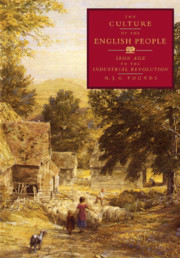Book contents
- Frontmatter
- Contents
- List of illustrations
- List of tables
- Preface
- List of abbreviations
- Map of traditional counties, with abbreviations, as used in this book
- Introduction
- 1 The view from Danebury
- 2 Roman interlude
- 3 House and household
- 4 Heat, light and insecurity
- 5 The house furnished
- 6 Food, its production, preservation and preparation
- 7 In sickness and in death
- 8 The community of parish and village
- 9 The family
- 10 The culture of cities
- 11 The foundations of popular culture
- 12 Conclusion: the end of popular culture
- Notes
- Index
10 - The culture of cities
Published online by Cambridge University Press: 06 July 2010
- Frontmatter
- Contents
- List of illustrations
- List of tables
- Preface
- List of abbreviations
- Map of traditional counties, with abbreviations, as used in this book
- Introduction
- 1 The view from Danebury
- 2 Roman interlude
- 3 House and household
- 4 Heat, light and insecurity
- 5 The house furnished
- 6 Food, its production, preservation and preparation
- 7 In sickness and in death
- 8 The community of parish and village
- 9 The family
- 10 The culture of cities
- 11 The foundations of popular culture
- 12 Conclusion: the end of popular culture
- Notes
- Index
Summary
Funny you can be so lonely with all these folks around.
Kurt Weill, Street SceneWhen I come out of the country hither to the City methinks I come into another world, even out of darkness into light.
Sermon at St Paul's, 1571The popular culture of cities and towns is, by its nature, a derived culture. Towns were a relatively late development; they could arise only when agriculture had been sufficiently developed to yield a surplus for their support, and the ratio of urban to rural population in traditional societies has always been low. Towns derived not only their basic food supply from the countryside, but also their population. Urban death-rates were generally higher, and birth-rates lower than in the countryside, and the net reproduction rate was for much of the time less than unity. There thus had to be a migration from the country to the town, and the vast number of locative personal names, indicating a village or place of origin, gives some idea of the distances covered by the migrants.
Many towns had no precisely known point of origin. They had grown in response to human needs, and in some form or other seemed to have existed from time immemorial. Some had been established by the Romans, had decayed and had been abandoned, leaving only an infrastructure of roads and the rumour that there had once been a city.
- Type
- Chapter
- Information
- The Culture of the English PeopleIron Age to the Industrial Revolution, pp. 341 - 378Publisher: Cambridge University PressPrint publication year: 1994



